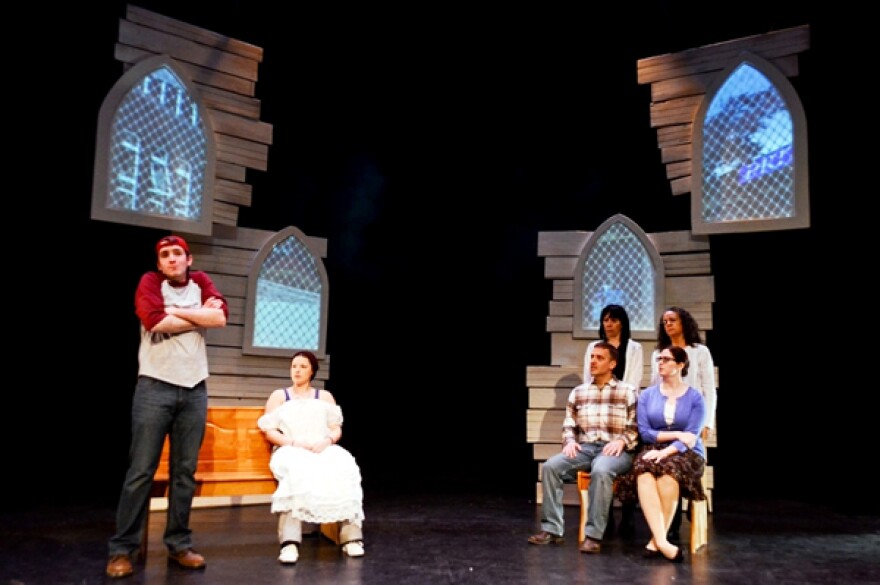J. Wynn Rousuck reviews "The Revelation of Bobby Pritchard," playing at Iron Crow Theatre through March 28th. Then, "The Dum Dums," which will continue at Gallery 788 through April 4th.
The Rousuck review of "Little Dancer" and "The Dum Dums."
Baltimore’s newer small theaters continue to be on the cutting edge. Iron Crow Theatre and Glass Mind Theatre have mounted two very different world premieres.
The more effective of the two, Rich Espey’s “The Revelation of Bobby Pritchard,” offers a shattering look at the consequences of closed minds. Joshua Conkel’s “The Dum Dums,” a less-developed work, offers an oddly lighthearted, science-fiction-infused look at the consequences of depression. In Espey’s powerful “Revelation of Bobby Pritchard,” the stark, scary opening scene recurs like the chorus of a song, and time shifts, repeats and reverberates – as memories rise to the surface.
Despite a few confusing time shifts, Iron Crow Theatre and its artistic director, Steven J. Satta, have done a compelling job shepherding and staging this complex play, on view at the Theatre Project.
The frightening, recurring opening scene is the wedding of two women, Marta, and Cyn (short for “Cynthia”). It’s a wedding at the southern church where Marta grew up.
The church scene repeats five more times. Marta, movingly played by Julie Herber, and Cyn, played by Susan Porter, stand facing each other, flanked by three others. Shots ring out. Each gunshot summons up flashbacks – primarily to Marta’s youth and her close friendship with Bobby Pritchard.
As a gay teenager in an intolerant, but purportedly religious Southern town, Marta tried to pretend to be what she was not -- and to convince her gay friend Bobby to do so, too. Now, in her dreams, Bobby pushes her to set the record straight and possibly make things easier for kids still growing up there.
It turns out, attitudes haven’t changed much in this town. To the contrary, the town boasts a treatment center to -- quote -- “fix” gays. When Marta and Cyn become the object of death threats, it only strengthens Marta’s resolve.
There are many things to admire in “The Revelation of Bobby Pritchard,” beginning with its fractured structure – which appears to reflect the many fractured truths in this town.
In addition, playwright Espey avoids the easy trap of portraying all small-town southerners as one-dimensional; Mary’s mother, in particular, is woman of great love and understanding. Sarah Lynn Taylor is exceptional -- double cast as both this warm character and a woman who is her narrow-minded, polar opposite.
The play’s ending is a bit murky, though it is clear in the script. Espey and director Satta may have decided to leave audiences feeling that hatred is pervasive, instead of specific. Right now, it’s an area – like some of the time shifts – that still needs honing.
Even so, “The Revelation of Bobby Pritchard” is an intriguingly structured play that plumbs depths of feeling in its characters and its audience.
-0-
Glass Mind Theatre is billing Joshua Conkel’s “The Dum Dums” as a “fully produced workshop.” It’s still very much a work in progress. Conkel is also the author of “MilkMilkLemonade,” which was produced by Single Carrot Theatre three seasons ago.
Both plays demonstrate a firm grasp of the way young people see the world. In “The Dum Dums,” three astronauts are launched into space, but miss their destination and land on the wrong planet.
One astronaut begins to hallucinate, and reality becomes intermingled with her favorite reality TV show. These are amusing interludes, as the actors – Liz Galuardi, Sam Hayder and Ann Turiano, as the captain -- make swift changes from astronauts to spoiled Malibu housewives.
But the playwright’s note in the program is just about the only clue that these interludes are symptoms of depression. The bleakness of space and a planet of perpetual night are also, presumably, metaphors.
At this early stage in its development, however, director Benjamin Kamine’s production of “The Dum Dums” comes across more like kids fooling around than a metaphorical examination of a serious subject. An ending that is too perfunctory doesn’t help.
Conkel’s an interesting, distinctive playwright with a feel for youth and pop culture, but “The DumDums” – which runs less than an hour – needs more fuel to achieve lift off.




